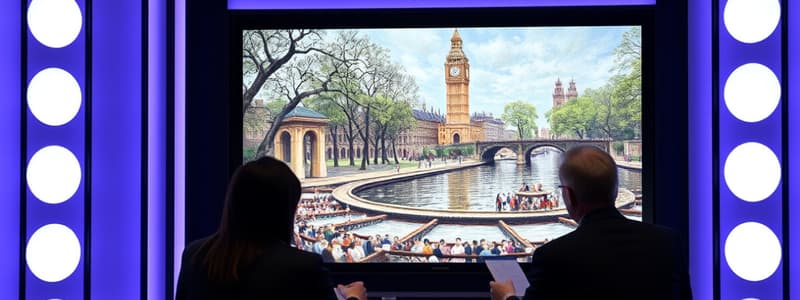Podcast
Questions and Answers
The regularly scheduled program that reports current events is called a _____
The regularly scheduled program that reports current events is called a _____
News Cast
Match the following TV broadcasting terms with their definitions:
Match the following TV broadcasting terms with their definitions:
Voice Over = Narration accompanying visuals Billboard = Standard first video of the program Commercial = Gap in reporting Teleprompters = Device that prompts speakers with text
What does the term 'Lower Thirds' refer to in TV broadcasting?
What does the term 'Lower Thirds' refer to in TV broadcasting?
- Graphics in the upper left or right corner of the screen
- End video in a show
- Introduction of the title of the show
- Graphics at the lower portion of the screen containing summaries and names (correct)
What is the primary source of illumination in lighting techniques?
What is the primary source of illumination in lighting techniques?
A Close-Up shot captures a broad view of the scene.
A Close-Up shot captures a broad view of the scene.
Which of the following roles is responsible for handling video cameras?
Which of the following roles is responsible for handling video cameras?
The _____ is an alerting mechanism for smooth collaboration in production.
The _____ is an alerting mechanism for smooth collaboration in production.
Flashcards are hidden until you start studying
Study Notes
TV Broadcasting Terminology
- TV Production: Entire process of creating a TV show, from writing and editing to preparation for broadcast.
- News Cast: Regularly scheduled program that reports current events to the audience.
Key Components of a News Program
- Headlines: Short teasers showcasing the top stories in a news program.
- Opening Billboard: First video that introduces a program, typically shown after the Opening Billboard (OBB).
- Closing: Final video segment of a show.
Narration and Visual Elements
- Voice Over: Narration that accompanies video visuals during a news report.
- Audio Video: Contains both the report and the narration by the news anchor.
- VTR Silent: News stories presented without audio narration, read by news anchors.
Graphics and On-Screen Text
- Violator: Graphics positioned in the upper left or right corner of the screen.
- Lower Thirds: Graphics at the bottom of the screen showing summaries, names, and designations of interview sources.
- Title Card: Introduces the title of the show, composed of text and graphics.
Advertising and Production Terminology
- Commercial: Gaps in reporting filled with advertisements.
- Bumper: Short visual material used for smooth transitions between segments within a newscast.
Role-Specific Terminology
- Script: Written document containing the TV news content, often formatted in split-page style.
- Director: Individual responsible for deciding how content is visually presented in the program.
- Cameramen: Operators in charge of handling video cameras during filming.
Essential Equipment
- Video Camera: High-end device utilized for creating moving electronic images.
- Teleprompters: Devices that display text for on-camera presentation, aiding speakers.
Microphones and Dynamic Elements
- Lapel Microphone: Clip-on device allowing hands-free operation for TV presenters and reporters.
- Crawler: Text that moves across the screen, typically providing supplementary information.
Camera Angles
- Wide Shot: Captures a broad view, providing the audience with context of the overall setting.
- Medium Shot: Focuses on the subject from the waist up, offering a closer view of the character/action.
- Close-Up: Highlights specific details or facial expressions, fostering a deeper connection with the audience.
Lighting Techniques
- Key Light: Main illumination source to create highlights and shadows on the subject.
- Fill Light: Reduces harsh shadows from the key light, ensuring a balanced lighting effect.
- Backlight: Positioned behind subjects, adding depth and dimension.
- Ambient Light: General lighting in the environment, providing natural illumination necessary for the scene.
Studying That Suits You
Use AI to generate personalized quizzes and flashcards to suit your learning preferences.





